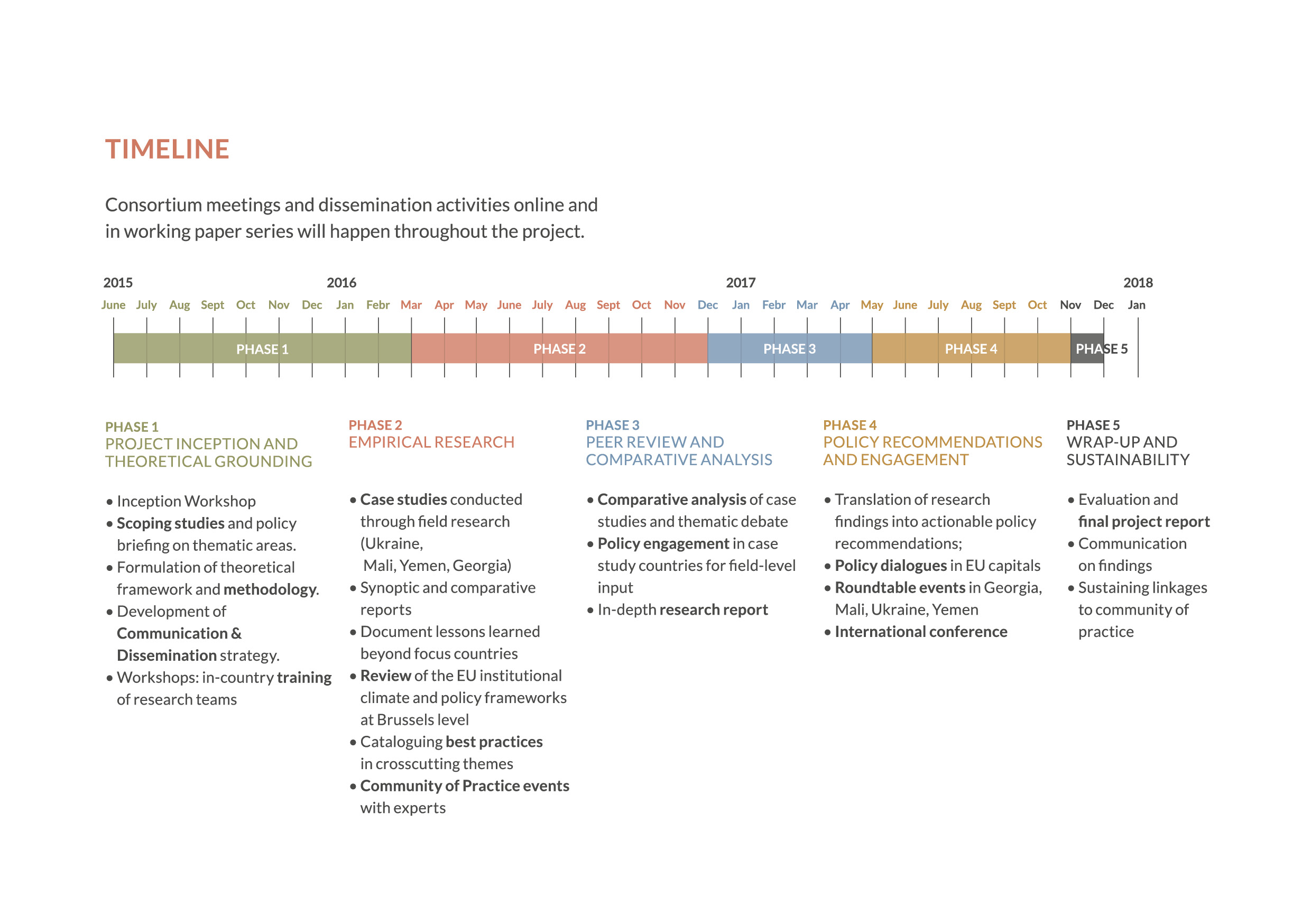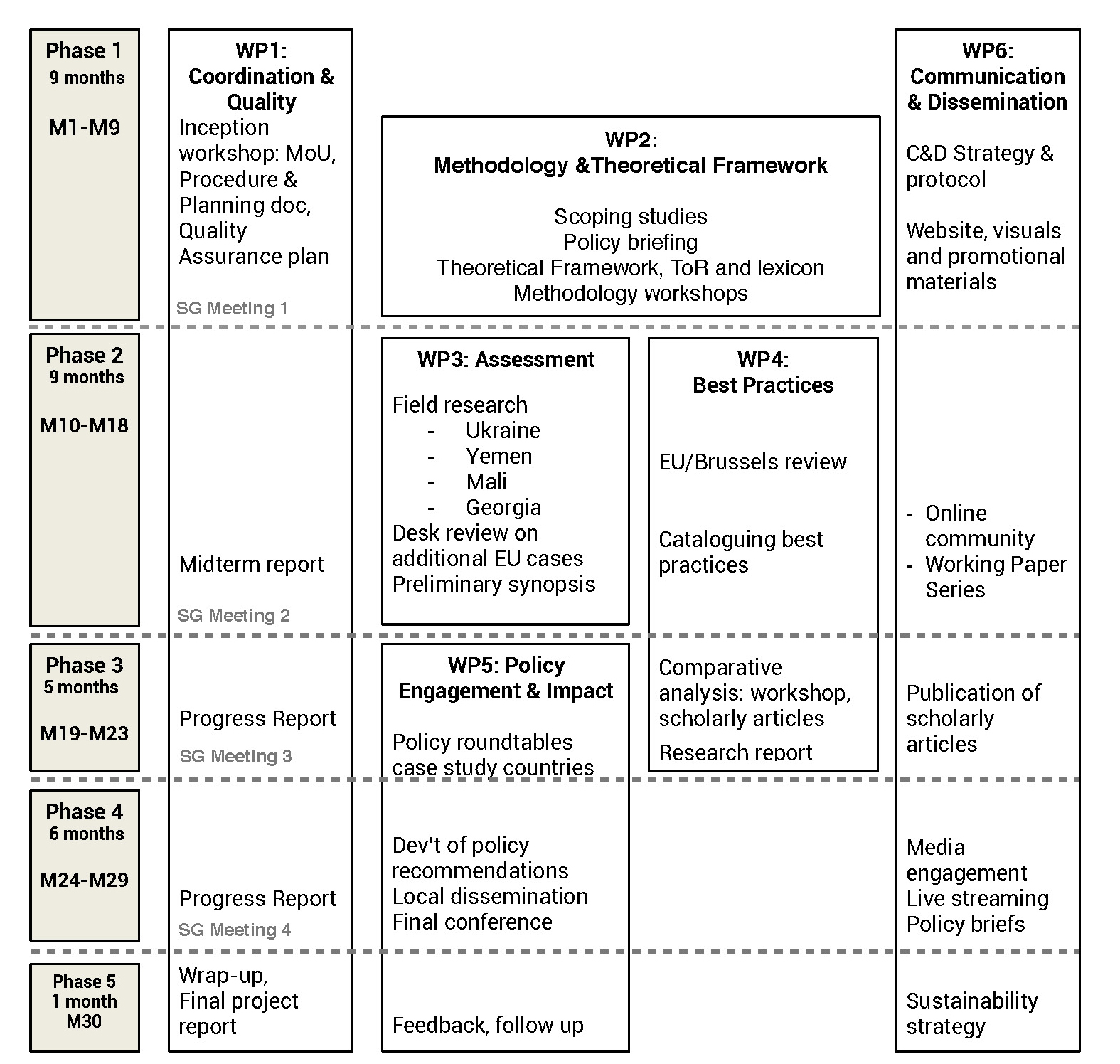TIMELINE

WORKPLAN
Phases and Deliverables
The Work Packages are organised in five clear-cut phases, which mark the milestones of the project. These milestones will be marked by Steering Group meetings and internal progress reports.
Phase 1 – Project inception and theoretical grounding (9 months)
WP1: Inception workshop, consortium MoU, set up of project communication tools and strategy, development of internal guidance/project management documents; Steering Group meeting.
WP2: Scoping studies and policy briefing, formulation of theoretical framework and methodology meeting with consortium members to agree on lexicon and terms of reference; in-country training for research teams.
WP6: Development of Communication & Dissemination strategy and protocol; project visuals and promotional materials; project website.
Phase 2 – Empirical research (9 months)
WP3: Case studies: data gathering, validation and integration of findings into case study reports; synoptic report on case studies and preliminary comparisons.
WP4: Review of the current EU institutional climate and policy framework at Brussels level; cataloguing best practices along crosscutting themes, Community of Practice events.
WP6: online community, live streaming of events, working paper series. WP1: Steering Group meeting, mid-term report.
Phase 3 – Peer review and comparative analysis (5 months)
WP4: Peer review of case study findings; comparative analysis of case studies and thematic debate
WP5: Policy engagement in case study countries for field-level input
WP6: working paper series. WP1: Steering Group meeting.
Phase 4 – Policy recommendations and engagement (6 months)
WP5: Translation of research findings into actionable policy conclusions; local policy events, international conference
WP6: media engagement, live streaming of events, Working paper series
WP1: Steering Group meeting.
Phase 5 – Wrap-up and sustainability (1 month)
WP1: Evaluation, final project report and Steering Group meeting
WP6: provisions for continuation of communication channels beyond the project period (community of interest, dissemination as part of consortium partner channels, linkages with relevant other projects and initiatives).
Work Package Coordination
GPPAC, UU, the LSE and IRENE will coordinate the project implementation and will be responsible for timely reporting and quality control according to the above role division. Work package leaders will collaborate with the following key functions:
Thematic leaders – Each crosscutting theme is delegated to a consortium partner, coordinated by the LSE in the Methodology and Best Practices work packages:
- Local ownership: LSE
- Gender: ECP
- Multi-stakeholder coherence: IRENE
- ICTs (Technological Support): LSE
- Civil-military synergies: GPPAC
Capability assessment leaders – There will be one consortium lead per capability cluster:
- Multi-track diplomacy: BF (supported by ECP)
- Security sector reform: GPPAC
- Governance: BF (supported by LSE)
Case study leaders & teams
- Consortium partners based in the case study countries
- USJPB, TSU, PDF and IWP - will lead and coordinate the case study teams, which will consist of local researchers, supported by UU as work package lead.
Policy Associates
- Third parties to the consortium members will be supporting the peer review process (WP4) and policy engagement (WP5). These include GPPAC members ICCN, AMES, HRITC and WANEP
- in the case study countries, and subject experts involved in the community of practice.
WORKPLAN TABLE

